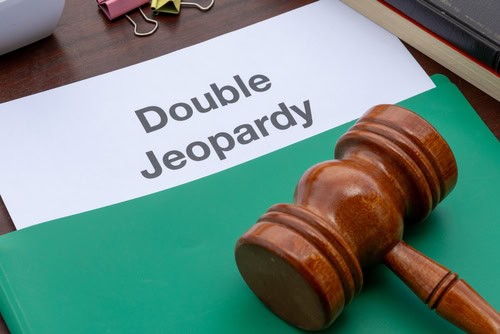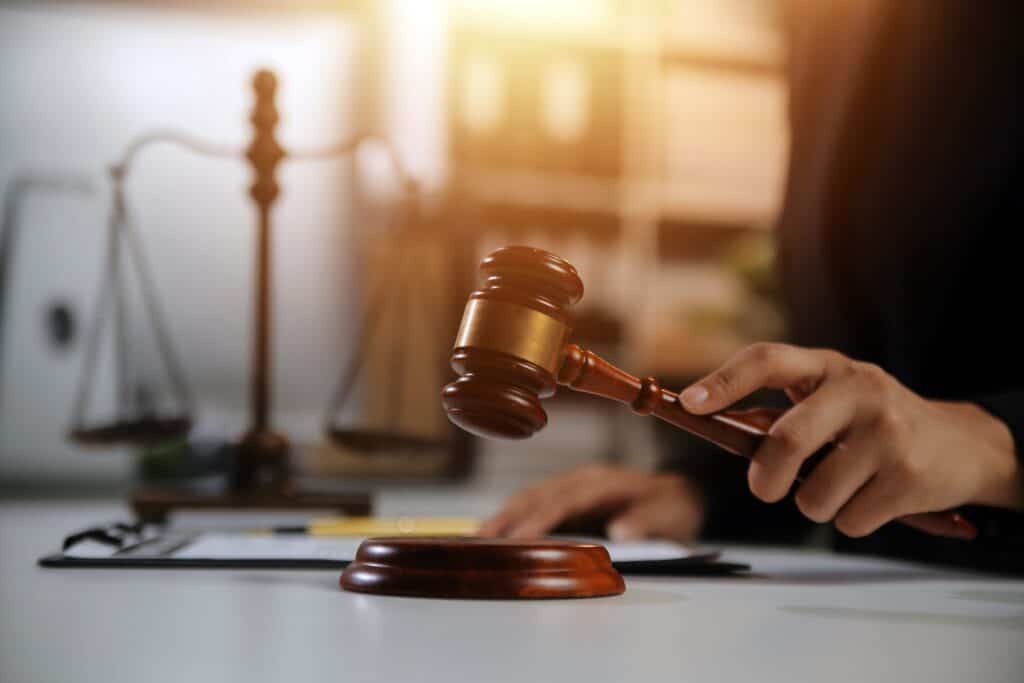
What is Double Jeopardy?
What is Double Jeopardy in Criminal Justice?
The concept of double jeopardy stands as one of the most fundamental protections in the American criminal justice system. This constitutional safeguard prevents the government from repeatedly prosecuting individuals for the same offense, ensuring that once a case is resolved, defendants can move forward without fear of endless legal persecution.
Understanding double jeopardy becomes crucial when facing criminal charges. This principle affects how cases proceed through the courts and what protections defendants can expect throughout the legal process. However, like many legal concepts, double jeopardy contains important exceptions and nuances that both legal professionals and the general public should comprehend.
Jacobs & Dow, LLC will explain the double jeopardy principle, examine its key protections, and explore the exceptions that allow certain retrials or prosecutions. We’ll also discuss what steps you should take if you find yourself facing criminal charges and how this constitutional right might apply to your situation.
What is the Double Jeopardy Principle?
Double jeopardy finds its foundation in the Fifth Amendment to the U.S. Constitution, which states that no person shall “be subject for the same offense to be twice put in jeopardy of life or limb.” This provision creates a fundamental barrier against government overreach in criminal prosecutions.
The principle operates on a simple premise: once the legal system has resolved a criminal case through acquittal or conviction, the government cannot retry the same defendant for the identical offense. This protection applies to both federal and state prosecutions, creating a uniform standard across all American jurisdictions.
The framers of the Constitution included this protection to prevent the government from using its vast resources to repeatedly prosecute individuals until achieving a desired outcome. Without double jeopardy protections, prosecutors could potentially retry cases indefinitely, creating an unfair advantage and placing enormous emotional and financial burdens on defendants.
Core Protections Under Double Jeopardy
1. Protection Against Retrial After Acquittal
When a jury finds a defendant not guilty or a judge dismisses charges, double jeopardy prevents any subsequent prosecution for the same offense. This protection remains absolute, even if new evidence emerges that strongly suggests the defendant’s guilt. The finality of acquittal serves as a cornerstone of defendant rights in the American legal system.
2. Protection Against Retrial After Conviction
Similarly, once a defendant receives a conviction and completes their sentence, the government cannot prosecute them again for the same crime. This protection ensures that individuals can rebuild their lives after serving their punishment without worrying about facing additional prosecution for resolved matters.
3. Protection Against Multiple Punishments
Double jeopardy also prevents courts from imposing multiple punishments for the same offense. This means a defendant cannot receive consecutive sentences for identical crimes arising from the same incident. However, courts can impose multiple punishments when a single act violates several distinct laws.
Important Exceptions to Double Jeopardy
1. The Dual Sovereignty Doctrine
One of the most significant exceptions involves the dual sovereignty doctrine. This legal principle allows both state and federal governments to prosecute the same defendant for the same conduct when it violates laws in both jurisdictions. Since state and federal governments represent separate sovereigns, each maintains the right to enforce its own laws.
For example, a bank robbery might violate both state robbery laws and federal laws regarding crimes against federally insured institutions. Under dual sovereignty, prosecutors at both levels could pursue separate cases against the same defendant without triggering double jeopardy protections.
2. Mistrials and Double Jeopardy
Certain circumstances permit a retrial even after proceedings have begun. When a court declares a mistrial due to manifest necessity — such as a hung jury, judicial misconduct, or other circumstances that prevent a fair trial — double jeopardy typically does not prevent retrial.
However, if prosecutors cause the mistrial through intentional misconduct designed to gain a tactical advantage, courts may invoke double jeopardy protections to prevent retrial. This exception ensures that the government cannot manipulate the trial process to secure multiple opportunities for conviction.
3. Appeals and Retrials
When defendants successfully appeal their convictions, they may face retrial without invoking double jeopardy protections. By appealing, defendants essentially waive their double jeopardy rights regarding that conviction. This exception allows the justice system to correct errors while maintaining the defendant’s right to challenge wrongful convictions.
4. Civil vs. Criminal Proceedings
Double jeopardy only applies to criminal cases and does not prevent civil litigation based on the same underlying conduct. A defendant acquitted of criminal charges may still face civil lawsuits seeking monetary damages. The different standards of proof and purposes between criminal and civil cases justify this distinction.
What to Do If Charged with a Crime
If you face criminal charges or believe charges may be forthcoming, consulting an experienced criminal defense attorney immediately becomes essential. The consequences of serious misdemeanor or felony convictions include substantial fines, incarceration, and a permanent criminal record that can affect employment, housing, and other life opportunities.
A skilled criminal defense lawyer will analyze your case thoroughly, develop favorable evidence, and explain all available options. An aggressive defense strategy may prevent a conviction entirely and preserve your clean record. Understanding your rights under double jeopardy and other constitutional protections requires professional legal guidance tailored to your specific circumstances.
You maintain the right to have your attorney present at all proceedings when charged with a crime. Additionally, you do not have to answer questions from police or prosecutors without your lawyer present. These rights protect you from self-incrimination and ensure that you receive proper legal representation throughout the process.
Experienced criminal defense attorneys understand how double jeopardy protections apply to various situations and can identify when prosecutors may be overstepping constitutional boundaries. They can also recognize opportunities to invoke these protections strategically during plea negotiations or trial proceedings.
Protecting Your Constitutional Rights
Double jeopardy represents more than just a legal technicality — it embodies fundamental principles of fairness and finality in the criminal justice system. This constitutional protection ensures that individuals cannot face endless prosecution for resolved matters, allowing them to move forward with their lives after legal proceedings conclude.
Understanding these protections helps defendants make informed decisions about plea bargains, appeals, and trial strategies. However, the exceptions and nuances surrounding double jeopardy require professional legal analysis to navigate effectively.
When facing criminal charges, securing experienced legal representation becomes crucial for protecting your rights and achieving the best possible outcome. The criminal justice attorneys at Jacobs & Dow, LLC have the experience you need. Contact us today to schedule a consultation.

